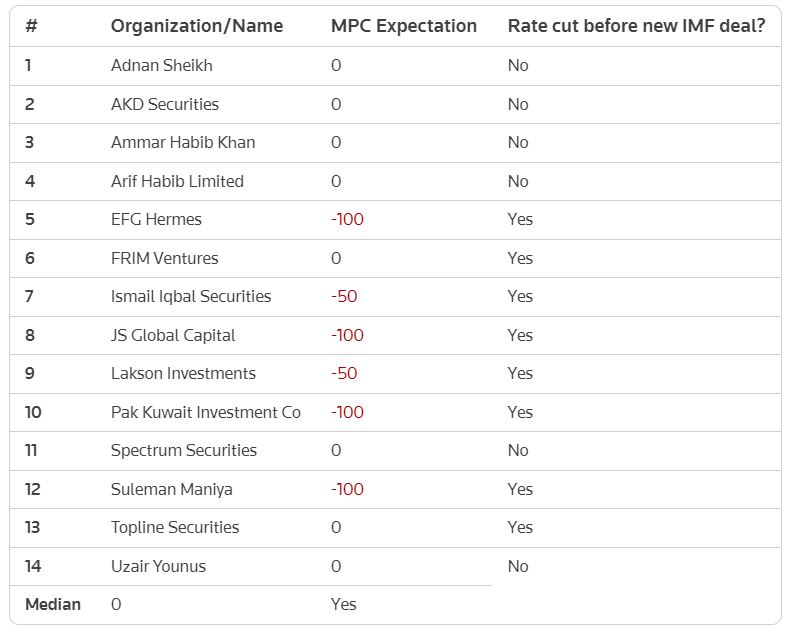KARACHI: Egyptian billionaire Naguib Sawiris has offered to build 100,000 housing units in Pakistan to help realize Prime Minister Imran Khan’s dream of an ‘ambitious’ housing project, officials said on Friday.
“Naguib Sawiris has expressed his will to invest in 100,000 units of affordable housing to help prime minister (Imran Khan) in his vision toward Pakistan,” Tarek Hamdy, Chief Executive officer of Elite Estates — a partnership between Ora Developer and Saif Holding — told Arab News in an exclusive interview.
Owned by Sawiris, Ora Developers is already engaged in the construction of a multibillion-dollar housing scheme named ‘Eighteen’ which was launched in 2017 in Islamabad with local partners, Saif Group and Kohistan Builders.
Sawiris’ first investment in Pakistan was in Mobilink, a cellular operator.
PM Khan in October 2018 had launched ‘Naya’ (New) Pakistan Housing Project in line with his party’s election manifesto, which promised fivr million houses for the poor.
Hamdy says they have “set rules or guidelines of the way of doing things” that apply to every real estate projects — whether they are affordable or high value units.
“We will use our experience and knowhow to deliver this properly to the people of Pakistan,” he added.
Since the announcement of the low-cost housing project for the poor, the scheme has been at the heart of all political and economic discourses with several calling it too ambitious.
“This scheme is very ambitious yet very promising for the people of Pakistan. I think all the developers should help in this scheme. You cannot solely rely on the government to build five million houses,” Hamdy said.
Recently, the governor of Pakistan’s central bank had said that the massive housing project would require financing of upto Rs 17 trillion.
Hamdy believes that the promise of building five million affordable housing units cannot be realized in a short span of time. “I think the plan is right but it has to be in stages, has to be in steps. It could be achievable obviously that is not the project (to be achieved) in one or two years... may take few good years, may be couple of decades to be achieved,” he said.
In the Islamabad project the Ora Developers own a 60 percent stake in the project comprising a five-star hotel, 1,068 housing units, 921 residential apartments, business parks, hospitals, schools and other educational facilities and 13 office buildings, and a golf course. The networth of the project is $2 billion.
The next cities on the radar for real estate projects are Lahore, Karachi, and Faisalabad. “We intend to do more, we intend to invest more. I think that our portfolio of real estate could come to $10 billion worth of investments in the next five to 10 years including all the projects that we intent to do,” Hamdy said.
Pakistan’s housing sector is marred by frauds, scams and unfinished schemes which has been discouraging many potential investors from venturing into the sector. However, Hamdy says he is confident of delivering the promise by 2021.
Analysts say that Pakistan’s housing sector offers great opportunities for investment due to increasing demand. “According to estimates, the current real estate market value is around Rs900 billion which is three times that of the GDP,” Saad Hashmey, an analyst at Topline Securities, told Arab News, adding that the PM’s housing project is the need of the hour.
Pakistan faces a shortage of nearly 12 million housing units that may require a massive investment of around $180 billion, according to the former Chairman of the Association of Builders and Developers, Arif Yousuf Jeewa.
Pakistan expects to attract more than $40 billion foreign direct investment in the next five years in oil refining, petrochemical, mining, renewable energy, and real estate sectors. “We estimate that roughly around $40 billion investment will be made by three countries (Saudi Arabia, the UAE, and China) during the next three to five years,” Pakistan Board of Investment BoI chief, Haroon Sharif had told Arab News earlier, adding that “the investment would start materializing within the next two years”.
Egyptian billionaire offers to build 100,000 housing units in Pakistan
Egyptian billionaire offers to build 100,000 housing units in Pakistan
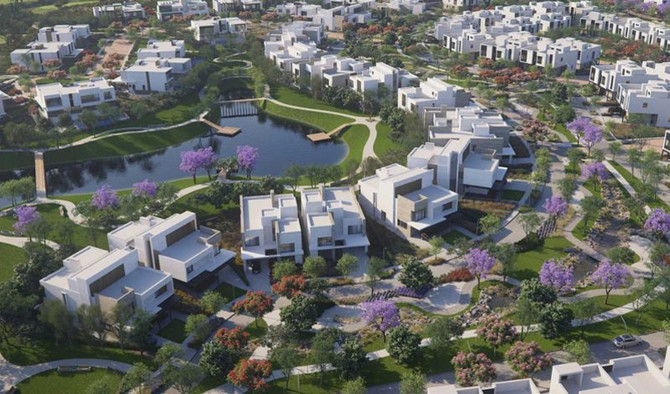
- Plan to construct 5mn housing units requires Rs17tr, State Bank says
- Group is already investing in a housing project in Islamabad
Pakistani driver bags first-ever top 4 finish at Dubai Nations Cup

- Enaam Ahmed, 24, was born to Pakistani parents in London, started racing on Go-Kart tracks at age eight
- Ahmed became a British Formula Champion at 12 and a European and World Champion at the age of 14
ISLAMABAD: British-Pakistani racer Enaam Ahmed achieved a ground-breaking milestone this week by securing Pakistan’s first-ever top 4 finish at the Nations Cup in the Dubai 12-Hour Endurance Karting Race.
Ahmed, 24, was born to Pakistani parents in London where he started racing on Go-Kart tracks while he was eight. His passion grew with time, and he ultimately became the British Formula Champion at 12 and a European and World Champion at the age of 14. He is currently in the American Formula 3 league, before which he was car racing in the British Formula 3 and became a champion at 17.
For the Dubai tournament, Ahmed told Pakistan’s Geo News he chose the “two most talented drivers from Pakistan” to make team Pakistan, namely Maz Chughtai and Shamiq Saeed.
In the qualifying round, Pakistan managed to secure 2nd place in the Nations Cup and 4th overall against 30 of the best endurance teams from around the world. Team Pakistan then delivered a historic top-4 finish, but also won over archrivals India with an impressive 9-lap lead even after dropping to 30th place due to an unlucky puncture.
“It’s an honor to represent Pakistan and to achieve this milestone alongside my teammates,” he told reporters. “We worked tirelessly to make our country proud, and to also secure a commanding victory over India adds an extra layer of satisfaction to our accomplishment … This victory not only underscores Pakistan’s prowess in motorsports but also opens a new chapter whereby a new generation of drivers will be inspired.”
Speaking to Arab News in an interview in 2022, Ahmed said what inspired him was a desire to “change the way the world perceives our country [Pakistan] and the Muslim world, in terms of sports.”
“Representing the country [Pakistan] is what gives me the power, what gives me the motivation to succeed ... What keeps me going is this burning ambition to prove that we can be the best.”
While Ahmed has traveled and raced in some top teams and against some of the best drivers in the world, he also had to face racism initially as a rare person of color alongside the black British driver, Lewis Hamilton, who had inspired him to enter the profession in the first place. Ahmed has also found it difficult to find good sponsors, which he said was the reason he missed the chance of getting into Formula 2 in Europe.
“There were moments when I didn’t want to give up but it was looking like I would have to give up because there was no option,” he said. “There were some situations when I didn’t have a sponsor one week before a race, but I always found a way.”
Despite the odds, there has been no looking back for Ahmed, who has never lost a race and always finishes in the top three.
“I have always done things to be the best or nothing,” he said. “I don’t do things just to take part or come second or third. I am here to win.”
Speaking about his special connection with Pakistan, he said he was “put on this earth to race for Pakistan and become a champion.”
“I have two biggest motivations: One is to make my country proud and raise the flag of Pakistan the highest it has ever been, and to relieve my parents, my family of work.”
Ahmed is also on the Road to Indy series, a racecar driver development program that provided a scholarship-funded path to reach the IndyCar Series and Indianapolis 500.
Pakistan’s economic conditions improving, reforms and privatization on track — PM
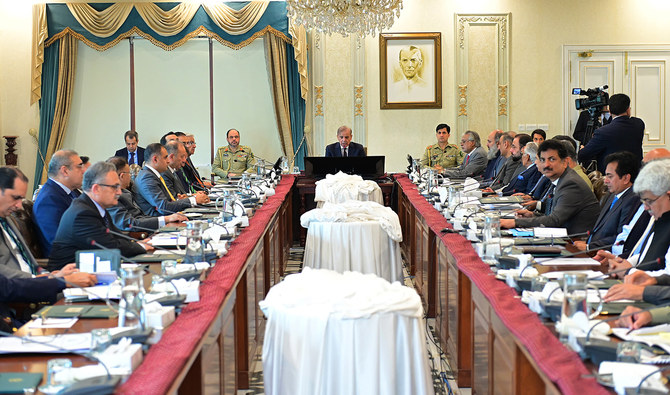
- Sharif says exports and remittances had shown a rise within one-and-a-half month of his government
- Pakistan’s finance ministry expects the economy to grow by 2.6 percent in the current fiscal year ending June
ISLAMABAD: Pakistan’s economic indicators are showing positive signs, with an agenda of painful reforms and privatization on track, Prime Minister Shehbaz Sharif said on Friday, ahead of an IMF board meeting to decide on a $1.1 billion funding for the country.
The prime minister said, in an address to his cabinet that was telecast live, that exports and remittances had shown a rise within one-and-a-half month of his government.
The IMF board is meeting on Monday to decide on the disbursement of the second and last tranche of a $3 billion standby arrangement Islamabad secured last summer to avert a sovereign default.
With a chronic balance of payment crisis, Pakistan needs $24 billion in payments for debt and interest servicing in the next fiscal year starting July 1 — three-time more than its central bank’s foreign currency reserves.
The South Asian nation is seeking yet another long-term, larger IMF loan. Pakistan’s Finance Minister, Muhammad Aurangzeb, has said Islamabad could secure a staff-level agreement on the new program by early July.
If successful, it would be the 24th IMF bailout for Pakistan.
The IMF-led structural reforms require Pakistan to raise its tax to GDP ratio from around 9 percent to at least 13 percent-14 percent, stop losses in state-owned enterprise and manage its energy sector losses which run into trillions of rupees.
“It is not just for an antibiotic to work anymore. It needs a surgery,” Sharif said.
Pakistan’s finance ministry expects the economy to grow by 2.6 percent in the current fiscal year ending June, while average inflation is projected to stand at 24 percent, down from 29.2 percent in fiscal year 2023/2024.
Inflation soared to a record high of 38 percent last May.
Pakistan joins calls by UN for ‘credible investigation’ into mass graves discovery in Gaza
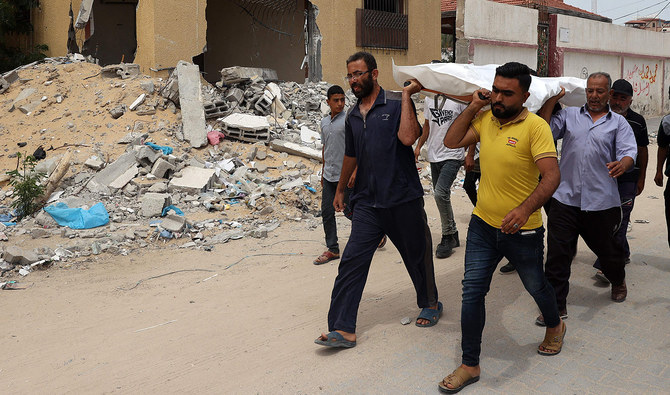
- Palestinian authorities say mass graves at Nasser and Al Shifa hospitals contain hundreds of bodies
- Pakistan says “independent and impartial investigation” must fix responsibility and punish perpetrators
ISLAMABAD: Pakistan said on Friday it joined the United Nations in calling for a “transparent and credible” investigation into the discovery of mass graves at two major hospitals in Gaza where over 34,000 Palestinians have been killed by Israeli attacks since October.
The discovery of the mass graves, said by Palestinian authorities to contain hundreds of bodies, have triggered calls by the UN rights chief and others for an international investigation. While not defined under international law, a mass grave is a burial site containing multiple bodies, the existence of which could be important in detecting possible war crimes.
Palestinian authorities said a grave site discovered at the Nasser hospital, the main medical facility in central Gaza, contained nearly 400 bodies. It was uncovered after Israeli troops pulled out of the city of Khan Younis.
Another grave site was also found by Palestinian authorities at the Al Shifa hospital in northern Gaza, which had been targeted by an Israeli special forces operation.
“Pakistan joins the calls by the United Nations for a clear, transparent and credible investigation of mass graves and the massacre of men, women and children by the Israeli occupation forces,” the foreign office spokesperson said at a weekly briefing in Islamabad.
“An independent and impartial investigation must be held to ascertain the facts, fix responsibility and punish the perpetrators of war crimes and crimes against humanity in Gaza.
“We urge the international community, especially the backers of Israel to take urgent measures to bring an end to the war on the people of Gaza. Lift the siege, protect civilians, facilitate humanitarian assistance and to hold to account the perpetrator of Gaza genocide.”
Currently, the International Criminal Court in The Hague has an active investigation into the attacks on Israel on Oct. 7 by Hamas and the response by the Israeli military.
The office of the prosecutor has jurisdiction in the Palestinian territories, but has not made any public comments about the discovery of mass graves.
Under the 1949 Geneva Conventions, to which Israel is a signatory, parties to a conflict must take all possible measures to prevent the dead from “being despoiled.” Customary international humanitarian law (IHL) calls for the dead to be respected, including a duty to prevent despoiling of graves and ensuring the identification and proper burial of human remains.
IHL also prohibits mutilation, desecration and other forms of disrespect toward the dead, while parties should take measures to protect grave sites, including those containing multiple human remains.
In 2002, in a case related to killings of Palestinians in the Jenin refugee camp in the West Bank, Israel’s Supreme Court ruled that the Israeli Defense Ministry was responsible under international law “for the location, identification, evacuation, and burial of the bodies” of Palestinians killed in fighting. The judges said bodies should not be buried in mass graves but handed over to the Palestinian authorities.
The International Criminal Court’s founding Rome Statute defines the desecration or mutilation of dead bodies as a war crime and this is banned as an outrage upon personal dignity.
Allegations by Palestinian authorities that the Israeli Defense Forces (IDF) had buried the bodies were “baseless and unfounded,” the IDF said in a statement. The graves were dug by Palestinians, it said, releasing footage showing the graves pre-dated IDF operations.
IDF forces searching for Israeli hostages had examined bodies buried near Nasser hospital and then returned them, the IDF said.
“The examination was carried out respectfully while maintaining the dignity of the deceased,” it said.
With inputs from Reuters
China says will continue investments in Pakistan after deadly suicide bombing
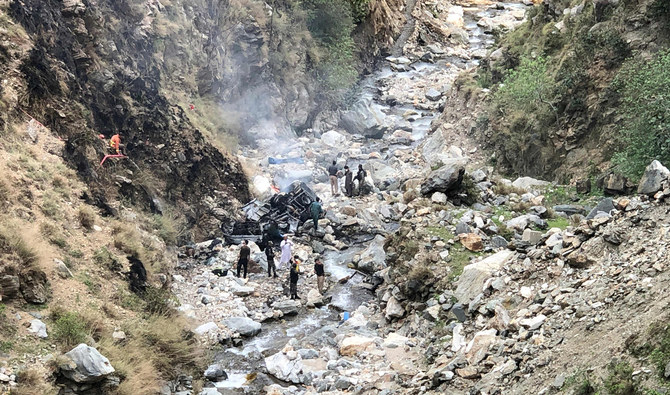
- On Mar. 26, suicide bomber hit a convoy of Chinese engineers working on Dasu hydropower project
- Five Chinese nationals and their Pakistani driver were killed in the attack in northwestern Pakistan
ISLAMABAD: The Chairman of the China International Development Cooperation Agency (CIDCA), Luo Zhaohui, said Beijing will continue to work with Pakistan to fulfill commitments made under the framework of the China-Pakistan Economic Corridor and the Global Development Initiative, Pakistani state news agency APP reported on Friday.
Luo’s statement comes a month after a suicide bomber rammed a vehicle into a convoy of Chinese engineers working on a hydropower project at Dasu in the northwestern Khyber Pakhtunkhwa province, killing five Chinese nationals and their Pakistani driver.
The assault on Mar. 26 was the third major attack in little over a week on China’s interests in the South Asian nation, where Beijing has invested more than $65 billion in infrastructure projects as part of its wider Belt and Road initiative.
Chinese contractors suspended work on three hydropower projects in view of security concerns after the March attack, government officials told media last month.
“China is ready to work with Pakistan to implement the consensus reached by the leaders of the two countries, further, deepen strategic mutual trust, and promote practical cooperation in various fields within the framework of the China-Pakistan Economic Corridor and the Global Development Initiative,” APP quoted Luo as saying.
“In his meetings with friends from various sectors during a recent visit to Pakistan, he hoped that friends from all walks of life would continue to exert their influence, and offer advice and suggestions for the development of bilateral relations.”
During the meetings, according to APP, Lou thanked Pakistani officials for “their long-standing contributions to China-Pakistan friendly cooperation, emphasizing the increasingly significant strategic importance of accelerating comprehensive cooperation between China and Pakistan and leading regional development trends.”
The Pakistani side expressed condolences over the Dasu attack and “highly praised the enduring traditional friendship” between Pakistan and China and their cooperation in various fields.
“They added that Pakistan will continue to support the development of Pakistan-China relations, advance exchanges on state governance, and expand friendly exchanges between the two countries in various sectors, including between governments, parliaments, business communities, think tanks, youth, and civil society,” APP said.
The Mar. 26 bombing followed a Mar. 20 attack on a strategic port used by China in the southwestern province of Balochistan, where Beijing has poured billions of dollars into infrastructure projects, and a Mar. 25 assault on a naval air base, also in the southwest. Both attacks were claimed by the Baloch Liberation Army (BLA), the most prominent of several separatist groups in Balochistan.
Dasu, the site of a major dam, has been attacked in the past, with a bus blast in 2021 killing 13 people, nine Chinese among them, although no group claimed responsibility, like the Mar. 26 bombing.
Pakistan is home to twin insurgencies, one mounted by religiously-motivated militants and the other by ethnic separatists who seek secession, blaming the government’s inequitable division of natural resources in southwestern Balochistan province.
Chinese interests are under attack primarily by ethnic militants seeking to push Beijing out of mineral-rich Balochistan, but that area is far from the site of the Mar. 26 bombing.
Pakistan central bank expected to hold rates on Monday ahead of IMF deal
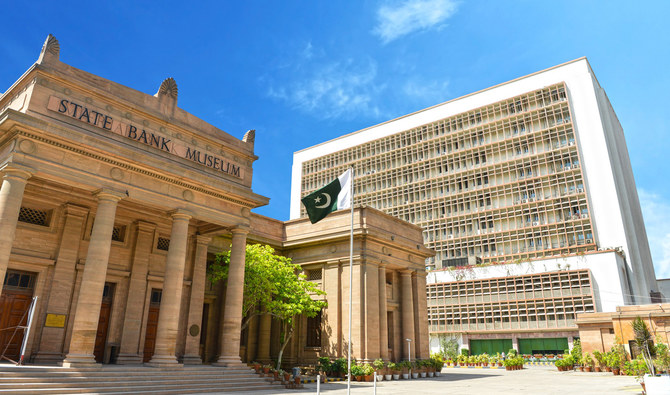
- Median estimate in Reuters poll predicts State Bank will hold rates steady
- South Asian nation is seeking new long-term, larger IMF bailout program
KARACHI: Pakistan’s central bank is widely expected to hold its key interest rate at a record 22 percent for the seventh straight policy meeting on Monday as Pakistan gears up for an International Monetary Fund board approval and talks on a longer term program.
Monday’s policy decision will be followed by the fund’s executive board meeting to discuss the approval of $1.1 billion in funding for Pakistan, which is the last tranche of a $3 billion standby arrangement with the IMF secured last summer to avert a sovereign default.
The median estimate in a Reuters poll of 14 analysts predicts the State Bank of Pakistan (SBP) will hold rates steady.
Four analysts are forecasting a 100-basis-point (bps) cut, while two expect a 50-bps cut on Monday.
Eight respondents expect a rate cut before Pakistan signs a new program with the IMF. There is another MPC meeting on 10 June 2024, which is possibly before Pakistan gets another IMF Programme.
The South Asian nation is seeking a new long-term, larger IMF loan. Pakistan’s Finance Minister, Muhammad Aurangzeb, has said Islamabad will begin talks with the fund next month, and could secure a staff-level agreement on the new program by early July.
Pakistan’s key rate was last raised in June to fight persistent inflationary pressures and to meet one of the conditions set by the IMF for securing the bailout.
Pakistan’s Consumer Price Index (CPI) for March rose 20.7 percent from the year before, slowing down partly due to the “base effect,” touching a record high of 38 percent in May 2023.
Tahir Abbas, head of research at Arif Habib Limited said that the central bank is unlikely to cut rates before getting a new IMF program. “The monetary policy will also consider the inflationary outcome of tensions in the middle east and its impact of fuel prices, along with the Fed’s delay in monetary easing,” he added.
“Expect a symbolic reduction in the current quarter (till June), with aggressive cuts to follow in the September quarter as the government has to roll over approximately 6.7 trillion rupees of maturing domestic treasury bills in the last quarter of the calendar year,” said Mustafa Pasha, CIO of Lakson Investments.
He added that by then there will be greater clarity on inflation and FX inflows. “Historically the SBP has cut rates in the 1st year of an IMF program and we expect the policy rate to settle around 17 percent by December.”
